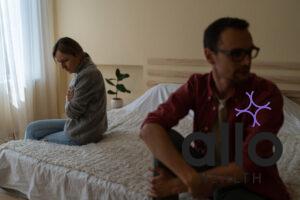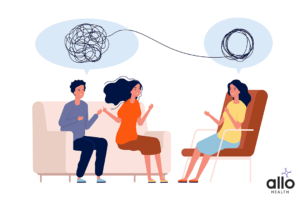Exploring the Impact of a Broken Sexuality

Allo Health is dedicated to personalized well-being, offering support and trusted information tailored to individual health goals. The platform emphasizes human-generated content, led by a distinguished medical team of experts, including physicians and sexual health specialists. Their commitment to credibility involves rigorous fact-checking, authoritative research, and continuous updates to ensure accurate, up-to-date information. Allo Health's unique approach goes beyond conventional platforms, providing expert-led insights and a continuous commitment to excellence, with user feedback playing a crucial role in shaping the platform's authoritative voice.

Dr. Aditi completed her undergraduate medical education at AJIMS, Mangalore, after which she worked in multi-speciality hospitals with COVID patients and in the Pain and Palliative medicine department. Driven by her experiences, she developed a keen interest in psychiatry. Dr. Aditi believes that mental health is just as, if not more important, than physical health.
Why This Was Upated?
Our experts continually monitor the health and wellness space, and we update our articles when new information became available.
Updated on 16 April, 2024
- Article was updated as part of our commitment to diversity, equity, and inclusion.

"The following blog article provides general information and insights on various topics. However, it is important to note that the information presented is not intended as professional advice in any specific field or area. The content of this blog is for general educational and informational purposes only.
Book consultation
The content should not be interpreted as endorsement, recommendation, or guarantee of any product, service, or information mentioned. Readers are solely responsible for the decisions and actions they take based on the information provided in this blog. It is essential to exercise individual judgment, critical thinking, and personal responsibility when applying or implementing any information or suggestions discussed in the blog."
Sexual trauma can have long-lasting effects on a person’s sexual development and relationships. It can lead to a broken sexuality that affects not only physical intimacy, but also emotional and mental health. In this article, we will delve into the causes and effects of a broken sexuality, and provide insights and resources to help those impacted by sexual trauma heal and find wholeness in their sexual lives.
Decoding Broken Sexuality

Broken sexuality is due to sexual trauma or negative experiences that have left a person with feelings of shame, guilt, or fear related to sex. This can manifest in a wide range of symptoms, including reduced libido, difficulties in arousal, pain during intercourse, intimacy issues, sexual dysfunction, anxiety, depression, and self-esteem problems.
Broken sexuality refers to a state in which an individual’s sexual experiences, desires, or functioning become disrupted, leading to distress, dissatisfaction, or dysfunction.
Exploring the Root Causes of Sexuality Broken
Broken sexuality can be caused by a wide range of experiences, including sexual abuse, assault, harassment, or even negative cultural attitudes towards sex. Trauma can significantly impact a person’s sexual development, leading to patterns of avoidance, fear, perverted sexuality and mistrust.
- Cultural and Societal Influences: Societal norms, religious beliefs, and cultural expectations can shape individuals’ attitudes toward sex. These influences may lead to feelings of shame, guilt, or fear, causing a rift in sexual expression.
- Early Childhood Experiences: The impact of early childhood experiences on human sexuality can be profound. Traumatic events, improper education, or exposure to negative attitudes towards sex can lead to distorted perceptions and beliefs, affecting adult sexual health.
- Lack of Communication: Inadequate communication about desires, preferences, and concerns between partners can hinder sexual satisfaction. Misunderstandings and unexpressed expectations often contribute to a strained sexual relationship.
- Past Sexual Trauma: Individuals who have experienced sexual trauma may struggle with intimacy and arousal. Trauma can lead to feelings of fear, guilt, or shame, creating barriers to a healthy sexual life.
- Medical Conditions: Certain medical conditions, such as diabetes, cardiovascular issues, or hormonal disorders, can disrupt sexual functioning. These conditions can affect blood flow, nerve function, and hormone levels, leading to difficulties in arousal and performance.
- Hormonal Imbalances: Hormones play a crucial role in sexual health. Imbalances, such as low testosterone or thyroid dysfunction, can result in reduced libido, erectile dysfunction, and other sexual concerns.
- Chronic Pain and Anti-Depressants: Chronic pain conditions or the use of certain medications, including anti-depressants, can impact sexual desire, arousal, and pleasure. These factors may affect physical sensations and mental well-being, influencing sexual experiences.
Impacts of Shattered Sexual Wellbeing
The effects of broken sexuality are:
- Diminished Quality of Life: Broken sexuality can significantly impact an individual’s overall well-being, leading to frustration, anxiety, and a decreased sense of happiness and fulfilment.
- Strained Relationships: Intimacy is a crucial component of healthy relationships. When sexual issues arise, couples may struggle with emotional distance, communication breakdowns, and conflicts, putting strain on the relationship.
- Affects Mental Health: Sexual and mental health are intertwined; a broken sexuality impacts mental well-being, leading to depression, anxiety, or low self-esteem. Conversely, mental challenges like anxiety or depression can trigger sexual issues, affecting relationships.
- Impact of Mental Health on Sexual Behaviors: Research has shown that individuals with mental health conditions are more likely to engage in risky sexual behaviours, such as unprotected sex or having multiple sexual partners. This can lead to an increased risk of sexually transmitted infections (STIs) and unintended pregnancies.
- Self-Esteem and Body Image: Sexual difficulties can erode self-esteem and body image, creating a negative cycle where reduced confidence further contributes to sexual challenges.
- Emotional Distress: Feelings of inadequacy, shame, and frustration associated with broken sexuality can lead to emotional distress, exacerbating existing psychological issues.
Navigating Broken Sexuality: Seeking Solutions

Breaking free from the confines of broken sexuality often involves embarking on a journey of sexual exploration. This process entails embracing curiosity, communication, and a willingness to step beyond comfort zones. By engaging in open conversations with partners, trying new experiences, and prioritizing mutual pleasure, individuals can gradually rebuild a sense of sexual connection and satisfaction.
- Open Communication: Addressing broken sexuality begins with open and honest communication. Couples should create a safe space to discuss their desires, concerns, and boundaries without judgment.
- Professional Help: Seeking guidance from qualified professionals such as sex therapists, counselors, or medical experts can provide valuable insights and strategies to overcome sexual challenges. Survivors of sexual trauma should seek therapy to address trauma’s effects on sexual development. Therapy aids in processing experiences, establishing boundaries, and cultivating healthy relationships. Society must acknowledge trauma’s impact and foster a culture of consent, respect, and healthy sexuality.
- Addressing Shame and Guilt in Sexuality: Shame and guilt often hinder healthy sexuality and relationships, especially for those who have experienced sexual trauma. These emotions can make individuals feel unworthy of positive relationships and trigger negative feelings like fear or disgust related to sex. To overcome these barriers, it’s vital to confront and release shame and guilt tied to sexuality. This process involves seeking therapy, cultivating positive self-talk, and establishing boundaries and self-care routines that prioritize well-being
- Self-Care and Mindfulness: Practicing self-care and mindfulness techniques can help manage stress, anxiety, and negative thoughts that contribute to broken sexuality.
- Exploration and Education: Educating oneself about sexual health, anatomy, and pleasure can empower individuals and couples to explore new ways of experiencing intimacy.
- Exploring Holistic Healing: Apart from therapy, there are additional pathways to healing after sexual trauma. Building healthy relationships, engaging in self-care activities, and practicing self-compassion are all effective approaches.
- Empowering Sexual Boundaries: Prioritizing boundaries is key for enhancing sexual well-being amidst challenges. Open communication with partners, rejecting discordant situations, and embracing self-care practices fosters emotional and physical health. Upholding these limits cultivates self-esteem and a positive sexual perspective, forming the basis for robust relationships.
- Importance of Communication: Open communication is vital for healthy sexual relationships, involving discussions about preferences, desires, and boundaries. Establishing consent through honest conversations builds trust and respect, overcoming challenges in intimacy. This boosts self-confidence, encourages exploration, and fosters satisfying sexual bonds.
- Unmasking Taboos: Challenging societal taboos and norms surrounding sexuality is essential to healing broken sexual experiences. Society’s expectations and judgments can perpetuate feelings of shame and inhibit healthy sexual expression. By dismantling these taboos and fostering an environment of acceptance, individuals can liberate themselves from the emotional burdens that contribute to broken sexuality.
- Rewriting the Narrative: Redefining one’s sexual selfhood is a transformative process that involves self-discovery, self-acceptance, and self-love. This journey entails breaking free from limiting beliefs and negative self-perceptions.
- A Holistic Approach to Healing: Healing broken sexuality requires a holistic approach that addresses the interconnectedness of the mind, body, and spirit. Incorporating practices such as mindfulness, meditation, yoga, and body-awareness exercises can promote a sense of harmony and balance. By following these holistic approaches one will realize the inherent goodness of gift of sex.
Navigating Healing Resources After Sexual Trauma
Various resources, such as trauma-focused therapy, online communities, and self-care practices, aid post-trauma healing. Self-care, encompassing yoga, watching favorite videos or engaging in favorite hobbies, meditation, journaling, and nature connection, fosters grounding and calm, facilitating reconnection with oneself.
One important resource for healing from sexual trauma is therapy. A therapist can provide a safe and supportive space to process emotions and experiences, and can offer tools and techniques for coping with trauma-related symptoms. It’s important to find a therapist who specializes in trauma and who feels like a good fit for individual needs and preferences.
Key Takeaways
- Broken sexuality can arise from various experiences, including trauma like abuse, assault, and negative cultural attitudes towards sex. Trauma can shape patterns of avoidance, fear, or mistrust, impacting sexual development.
- Childhood events, such as trauma or inadequate sex education, can distort perceptions, impacting adult sexual health.
- Survivors of sexual trauma may struggle with intimacy, arousal, and guilt or fear. Medical conditions and hormonal imbalances can also impact sexual health.
- Broken sexuality and mental health are intertwined. Mental challenges can trigger sexual issues, while sexual problems can lead to depression, anxiety, or low self-esteem.
- Navigating broken sexuality involves setting boundaries, seeking professional help, addressing shame, practising self-care, and exploring holistic healing.
- Seek help from qualified professionals like therapists to overcome sexual challenges, especially for survivors of trauma.
Conclusion:
Healing from sexual trauma and overcoming a broken sexuality is a unique journey, and it’s important to celebrate progress along the way. This may include recognizing personal growth, setting and achieving goals related to sexual wellness, and practicing self-compassion and self-love.
In the colorful picture of being human, our sexuality is like a bright thread that brings joy, closeness, and who we are. When our sexuality feels troubled, it can dim this picture, but it doesn’t have to stay that way. By learning more about ourselves, talking openly, questioning what society says, and taking care of ourselves in many ways, we can fix how we feel. As we walk this journey, we can bring back the closeness, feel better about ourselves, and shine with newfound strength in everything we do.
Frequently Asked Questions:
Q. What are the main causes of broken sexuality?
A. Broken sexuality can stem from a range of experiences, including traumatic events like abuse or assault, negative cultural attitudes towards sex, and early life influences such as inadequate sex education. These factors can lead to patterns of fear, avoidance, and mistrust, affecting sexual development.
Q. How does culture and society impact sexuality?
A. Cultural norms, religious beliefs, and societal expectations play a significant role in shaping attitudes towards sex. These influences can lead to feelings of shame, guilt, or fear, which may hinder healthy sexual expression and intimacy.
Q. Can mental health affect one’s sexuality?
A. Yes, mental health and sexuality are intertwined. Mental challenges can trigger sexual issues, and sexual problems can lead to conditions like depression, anxiety, or low self-esteem. Addressing both mental and sexual well-being is crucial for a balanced and fulfilling life.






































